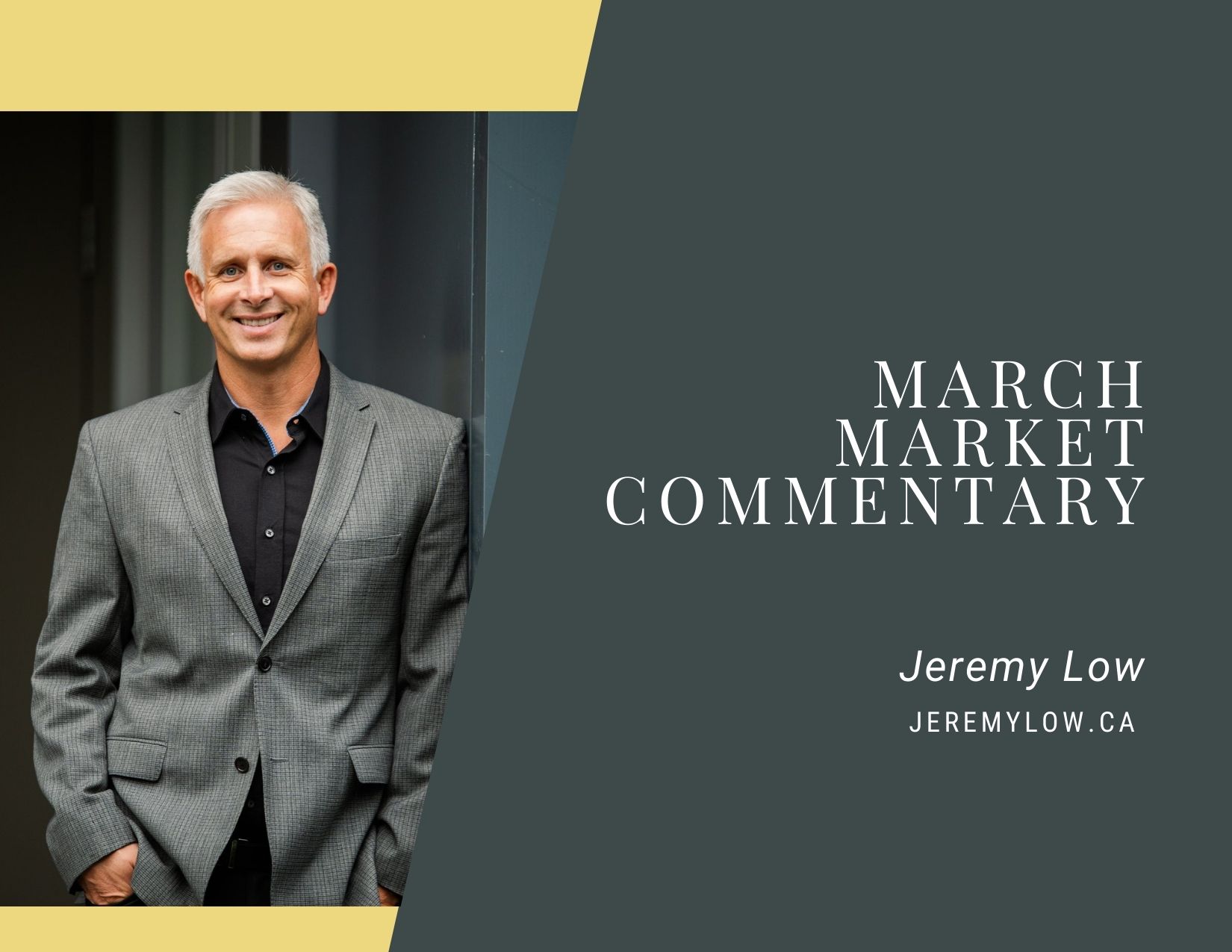Happy March!
Happy March! We’ve been experiencing the “downside” of volatility this last month, and political headlines, tariffs, and emotions seem to be in charge of the market right now rather than actual business conditions. These are challenging markets and lots of concern right now, so I hope some perspective might help.
I went to the racetrack last weekend. My men’s soccer team had booked a room for a social for the team’s year-end party at Fraser Downs. I’d never watched harness racing before, and its novelty and good company made for a fun evening. I am sure there is the basis of some psychology paper on personalities just from watching how everyone placed their bets. Some studied the racing handbook and odds; some went with their favourite number or colour; some waited to see the horse and jockeys do a warm-up lap and went with whatever “feeling” the horse gave them. I picked my choices purely based on the horses’ names. I went with a money theme and had $5 bets on horses with names like “Bay Street Buddy,” “More Monet,” and “Credit is Magic.” Surprisingly, my betting strategy did not pay off for me, and I walked away, having lost $20 by the night’s end.



I have been having many conversations with clients these last few weeks about the state of the world. The “Trump Bump” that markets experienced when Trump first won has turned into the “Trump Slump” as markets are now down over 10% from their highs on uncertainty and worries about tariffs. Watching the horses reminded me of a bit I saw years ago by the comedian John Mulaney when Trump took office in his first term. He likened Trump getting into office to a horse getting loose in a hospital. “I think every thing is going to be alright eventually, but nobody knows what is going to happen in the short term as we’ve never seen a horse in a hospital. The horse himself doesn’t know what he’s going to do next, as he’s never been in a hospital either. There’s no horse in hospital experts who can tell us what to expect as it’s never happened before. Sometimes the horse is rampaging and damaging equipment, sometimes he’s just doing something interesting, like riding the elevator”… You get the idea. It’s a brilliant bit of comedy and well worth watching if you haven’t seen it.
Trump 2.0 is an amplified version of his first term in office. We thought we knew what to expect, but Trump has proven impossible to underestimate! Having control of the House, Senate, and judiciary has exposed us to an unconstrained Trump. In his first 90 days in office, he has brought up taking over the Panama Canal, buying Greenland, annexing Canada, putting a resort in the Gaza Strip, ending the Russian/Ukraine war, and saving hundreds of billions from the creation of the Elon Musk-led Department of Government Efficiency (DOGE).
One of the (many) problems with Trump is that he provokes an emotional response to almost everything he says and does. Every interaction he has is defined in terms of “winners’ and “losers.” It makes everything he says and does feel worse as he is so ideologically antagonistic in all his communication. You almost have to admire the confidence, if not the logic, behind his announcements.
There is a callousness to watching Musk run around cutting jobs and programs in government that is hard to watch. You shouldn’t be treating the government like a private company. You can expect to blow up a few rocket ships at SpaceX before you find success. In government, that mentality is probably not the correct course of action. There is also no doubt that the government has a lot of fat and corruption that perhaps needs addressing. Do you believe that Musk is a genius who will propel the world forward with his companies and find and eliminate government waste? Or do you think that he is an amoral narcissist, drunk on his newfound political power who is going to cause damage in his efforts to prove his worth? I think most rational people will agree that both are probably true. I also believe that the most likely path forward is that he is going to get bored running around in government, and the hit to his pocketbook that is happening as he antagonizes a population that he ultimately wants to sell to will eventually get him out of government and back to building more stuff.
Tariffs are a complicated tool for countries. There are arguments to be made for using targeted tariffs to further national interests. I watched with some bemusement the Canadian outrage about Trump threatening a 250% dairy tariff from Canada. Canada currently imposes tariffs that can exceed 200% on US dairy products on imports that surpass quotas established under the US-Mexico-Canada agreement. There is a reason we often buy milk and cheese in the US whenever we are down there! Why does the EU have a 10% tariff on US cars, while the US tariff on European cars is only 3%? I’m not sure – complicated!
Most economists will agree that all-encompassing barriers to trade are just bad policies as they raise costs and constrain demand, which translates into higher inflation and slower growth. There is nobody who thinks that a global trade war is going to be good for the economy. What is the most probable outcome here? There is no question that the world needs the US more than the US needs the rest of the world when it comes to trade, but it just hurts US companies a little less; nobody wins. It is certainly going to be a constraint on growth. Does Trump really want a global trade war to bring back coal mining to the US? Or is he trying to bully his trading partners into improving the terms in current trade deals and is willing to suffer some short-term pain to do so?
There are no certainties in economics, only probabilities. I’m not willing to be “certain” about anything related to Trump. Still, I would consider that for a president who wants a strong economy and stock market as part of his legacy, it is unlikely that a protracted global trade war is part of his long-term plans. The trick to being a good investor is to ignore your feelings, think logically, stay calm, and keep a long-term perspective on your investments.
In a world where we have never been more inundated with useless news, data, and opinions, beware of being pulled into the viewpoints of extremists. It’s easy to do as they make the most noise, but try to make your financial decisions based on logic rather than emotion.
There is no question that the Canadian economy will suffer in the short term. There is also no question that the Canadian economy has suffered, especially in relation to the US, for much longer than the last two months. We were not in good shape long before Trump took office. I hate being bullied into it, but I genuinely believe the Canadian economy needed a hard push to wake up. It’s painful but probably necessary. I didn’t like the Canadian economy before the tariffs and like it even less now, but I hope it will represent a break in the current cycle. Policymakers now have a major incentive to quickly reduce taxes, promote investment, reduce inter-provincial trade barriers, and try and diversify our trade.
Serious investors are long-term thinkers who look through the noise of short-term headlines. Warren Buffet once said, “someone’s sitting in the shade today because someone planted a tree a long time ago.” Don’t worry about what Trump will do next or what Elon says. It is outside our control, regardless. Just continue to ask, ‘what are the businesses that we own worth?’. “Bay Street Buddy” lost me some money last Friday, but investing in good companies is very different than betting on a horse. We don’t lose anything if we don’t sell, and the businesses we own have durability, they have moats, they generate cash flow, and they will adapt. The market correction, or crash, will eventually be a footnote in an economics textbook explaining one of the many blips you will have gone through as a long-term investor.
Trust the process, keep your discipline, and try not to interrupt the miracle of compounding!
Jeremy

leave a comment